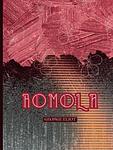George Eliot
George Eliot was the pen name of Mary Ann Evans, a Victorian novelist, poet, journalist, and translator. Born on November 22, 1819, in Warwickshire, England, she chose a male pen name to ensure her works were taken seriously in an era when female authors were often associated with romantic novels. Her novels, known for their realism and psychological insight, include 'Middlemarch', 'The Mill on the Floss', 'Silas Marner', and 'Adam Bede'. She died on December 22, 1880.
Books
This list of books are ONLY the books that have been ranked on the lists that are aggregated on this site. This is not a comprehensive list of all books by this author.
-
1. Middlemarch
Set in the fictitious English town of Middlemarch during the early 19th century, the novel explores the complex web of relationships in a close-knit society. It follows the lives of several characters, primarily Dorothea Brooke, a young woman of idealistic fervor, and Tertius Lydgate, an ambitious young doctor, who both grapple with societal expectations, personal desires, and moral dilemmas. Their stories intertwine with a rich tapestry of other townsfolk, reflecting themes of love, marriage, ambition, and reform, making a profound commentary on the human condition.
-
2. The Mill on the Floss
"The Mill on the Floss" is a novel that explores the lives of siblings Tom and Maggie Tulliver, who grow up at Dorlcote Mill on the River Floss. The book delves into their experiences in the rural society of the time, their complex relationship, and the choices they make in adulthood. The story is marked by themes of love, betrayal, societal expectations, and the struggle between individual desires and family obligations. The tragic ending underscores the consequences of societal norms and the struggle against them.
-
3. Silas Marner
Silas Marner, a weaver, is wrongfully accused of theft and excommunicated from his community in Lantern Yard. He moves to the village of Raveloe, where he lives as a recluse, hoarding his money. After his money is stolen, he adopts a young girl named Eppie, who was abandoned near his home. Eppie's presence transforms Silas's life, and he becomes a cherished member of the community. The novel explores themes of betrayal, redemption, and the transformative power of love.
-
4. Daniel Deronda
"Daniel Deronda" is a novel that explores the intersecting lives of its two main characters: Gwendolen Harleth, a beautiful but shallow young woman who is forced into an oppressive marriage to escape poverty, and Daniel Deronda, a compassionate and intelligent young man who, after being raised by a wealthy English gentleman, discovers his Jewish heritage. The story delves into themes of love, identity, and moral responsibility, set against the backdrop of Victorian England's societal norms and prejudices.
-
5. Adam Bede
"Adam Bede" is a 19th-century novel set in rural England that explores the themes of love, betrayal, and moral responsibility. The story revolves around a hardworking carpenter, Adam Bede, who is in love with a vain but beautiful dairymaid, Hetty Sorrel. However, Hetty is seduced by a young, thoughtless squire, Arthur Donnithorne, which leads to her becoming pregnant. When Arthur abandons her, Hetty leaves her baby in the woods, where it dies, and she is subsequently charged with infanticide. Adam, devastated by Hetty's actions, finds solace and eventually love with a devout Methodist preacher, Dinah Morris. The novel ends with Adam and Dinah marrying, finding happiness after the tragedy.
-
6. Felix Holt, The Radical
"Felix Holt, The Radical" is set in a small English town during the time of the Reform Act of 1832, a period of significant political and social upheaval. The novel centers on Felix Holt, an idealistic young man who returns to his hometown with the aim of making a difference in the world through political activism. He becomes involved in local elections, advocating for reform and the rights of the working class. His life becomes further complicated when he falls in love with Esther Lyon, the intelligent and refined daughter of a local dissenting minister. Their relationship, along with the turbulent political landscape, leads to a series of dramatic events that challenge their beliefs and aspirations. The novel explores themes of integrity, social responsibility, and the impact of individual actions on broader societal change.
-
7. Romola
Set against the backdrop of the Italian Renaissance in 15th-century Florence, this novel weaves the tale of a young and noble woman who navigates the complexities of her life amidst political and personal turmoil. As she grapples with the moral decay of her husband and the societal expectations placed upon her, she embarks on a journey of self-discovery and intellectual awakening. Through her trials and tribulations, the protagonist emerges as a figure of resilience and virtue, embodying the ideals of enlightenment and personal growth. The narrative not only explores themes of love, betrayal, and redemption but also delves into the historical and cultural milieu of Renaissance Italy, offering a rich tapestry of the period's art, politics, and philosophy.
-
8. Scenes Of Clerical Life
The book is a collection of three novellas that mark the author's foray into fiction, offering a penetrating look at the lives of clergymen and their communities in early 19th-century England. Through a series of vividly drawn characters and settings, the work explores themes of morality, social change, and the complexities of human relationships. The stories delve into the personal struggles and moral dilemmas faced by the clergy, as well as the impact of their actions on the small-town parishioners they serve. The narrative blends humor and pathos to provide a nuanced portrayal of provincial life, highlighting the author's deep understanding of human nature and her ability to evoke empathy for her characters' varied plights.







